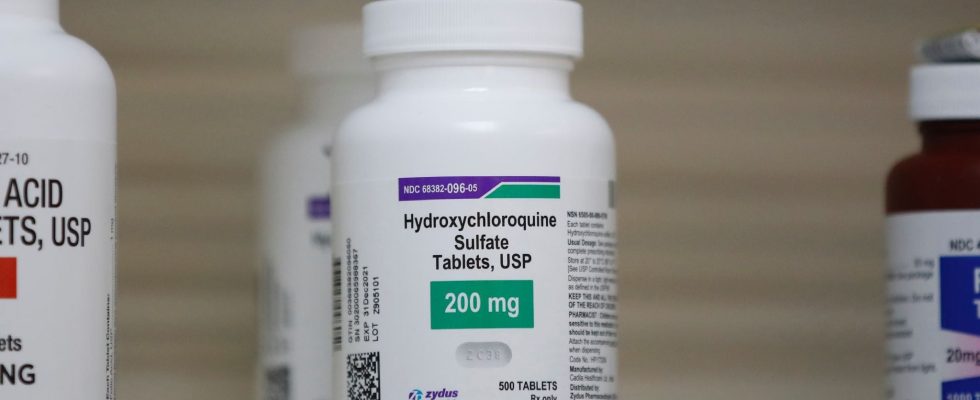Hydroxychloroquine is probably the drug that has attracted the most attention since the Covid-19 pandemic. Promoted as a “miracle molecule” by Professor Didier Raoult, former director of the IHU in Marseille, hydroxychloroquine was first prescribed massively in many countries. Then studies confirming its ineffectiveness in the treatment of this disease, associated or not with other molecules, accumulated. Just like the work which showed that it could have potentially dangerous side effects, including heart rhythm disturbances, but also cause a loss of opportunity for patients by delaying the use of other effective treatments.
Today, the question is a consensus among the scientific and medical communities: hydroxychloroquine is ineffective and potentially dangerous in the treatment of Covid-19. And new elements allow this position to be further established, since a team of researchers led by Jean-Christophe Lega, professor of therapeutics at the Hospices Civils de Lyon, just published a study in which they indicate that prescriptions for hydroxychloroquine, during the first wave of Covid-19, caused thousands of deaths.
16,990 deaths in six countries, including France
Their work, preliminary at the time, was presented for the first time in June 2022then in June 2023. This time, the final results are published in due form in the scientific journal Biomedicine & Pharmacotherapy, which verified the researchers’ calculations and analyses. “The reviewers did not question our method and confirmed that we had been extremely cautious in our estimates,” indicates Professor Jean-Christophe Lega, co-author of the study, interviewed by L’Express. Our certainty regarding hospital mortality is extremely strong,” he insists. His team’s conclusions are clear: hydroxychloroquine caused the death of 16,990 people in all six countries studied, namely Belgium, Spain, France, Italy, Turkey and the United States. .
To achieve this result, Professor Lega’s team estimated global hospital mortality attributable to the use of hydroxychloroquine by combining the mortality rate, exposure to hydroxychloroquine, the number of hospitalized patients and the increase in the relative risk of death linked to this medication, estimated at 11% according to the results of a previous study published in Nature Communications.
The mortality rate of hospitalized patients in each country was then obtained using the result of a meta-analysis bringing together the results of 44 clinical trials. “Using median estimates of hydroxychloroquine use in each country, we estimated that 16,990 hospital deaths related to this drug occurred in countries for which data were available,” the authors said.
A total probably underestimated
“What should be kept in mind is that this is a rough estimate, in the sense that it only concerns a few countries for a short period of time and the total number of deaths is probably much bigger”, underlines Professor Lega. Indeed, this work analyzes the results of “only” six countries – India and Brazil, very important prescribers of hydroxychloroquine, are for example absent – and only covers the period March-July 2020, while prescriptions of hydroxychloroquine were carried out well after this date.
“Moreover, this study only counts hospital deaths: not all cardiac arrests in the city are taken into account,” adds Professor Mathieu Molimard, head of the medical pharmacology department at Bordeaux University Hospital, who read the study but did not participate. This figure therefore only represents the tip of the iceberg and could be underestimated by up to a factor of five: it is a real health scandal.”
Another limitation of the study is that hydroxychloroquine prescription rates fluctuate considerably between countries, ranging from 16% (in France) to 84% (in Spain). The number of deaths associated with the use of this drug also varies greatly: from 95 in Turkey, to 199 in France, 240 in Belgium, 1,822 in Italy, 1,895 in Spain and up to 12,739 in the United States. The authors readily acknowledge these limitations in the conclusions of their study, where they indicate that their estimates “are limited by their imprecision”. They nevertheless assure that their results “illustrate the risk of repurposing drugs with low level evidence”.
Recommendations for a possible future pandemic
This is why scientists wrote an entire paragraph dedicated to recommendations for a possible future pandemic. “We believe first of all that it is necessary to put in place better regulation of candidate drugs in the event of a new disease,” underlines Professor Lega. We should then set up randomization platforms which make it possible to produce, in only a few months, studies with a very high level of scientific proof.”
The researchers also point out that elected politicians should limit their injunctions to the medical community. “The most striking example is the communication of Donald Trump, who widely promoted hydroxychloroquine. However, even if it is not possible to prove that he is directly responsible, we have observed an explosion in prescriptions for this medicine after his positions”, illustrates Professor Lega. Finally, the researchers point out that experts should also be more cautious, and avoid “generating extrapolations.” A barely veiled criticism of Professor Didier Raoult.
The future study by Professor Lega and his team will focus on the effects of all the treatments prescribed during the pandemic. “We have carried out a new systematic review of all molecules and have already noted that the rate of exposure to drugs has been extremely high, with the use of drug cocktails, explains the researcher. We want to try to find out what effects this has had and whether we should let doctors prescribe what they want based on their intuition or not.” According to him, the answer will probably be negative.
